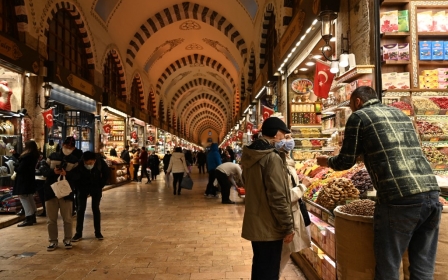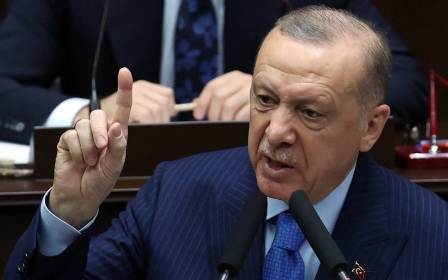Turkey: Inflation hits 20-year high of 61 percent

Turkey’s inflation rate rose to a 20-year high on Monday as analysts pointed to the impact of Russia’s invasion of Ukraine and President Recep Tayyip Erdogan’s interest rate policy as causes.
With the cost of living ratcheting upwards for millions of Turks, consumer prices rose by 61.14 percent at an annual rate, up from 54.4 percent in February, according to the statistics agency.
Turkey has recorded double-digit inflation since early 2017, but the latest figure is the highest since the ruling Justice and Development Party (AKP) came to power in 2002.
The weakening lira and the subsequent inflation have become significant sources of public discontent in the country.
The currency was stable following the latest inflation data, trading at 14.7 lira against the dollar and 16.2 lira against the euro.
New MEE newsletter: Jerusalem Dispatch
Sign up to get the latest insights and analysis on Israel-Palestine, alongside Turkey Unpacked and other MEE newsletters
But on Friday, S&P global rating agency kept a negative outlook on Turkey and its credit rating.
“The fallout of the Russia-Ukraine military conflict, including rising food and energy prices, will further weaken Turkey’s already tenuous balance of payments and exacerbate inflation," it said.
According to the agency, the most significant price increases in March were due to transportation and food prices.
The Russia-Ukraine war has had a major impact on Turkey, with Russia a key supplier of energy and Ukraine a leading supplier of wheat to the country.
Turkey also depends heavily on Russian tourists.
On Saturday, Erodgan said the increase in food and energy prices triggered by the war in Ukraine “is affecting us too”.
“We are fighting against those who are charging unreasonably high prices,” he said.
Referring to people squeezed by rising inflation levels, he said: “There are problems we need to address…I ask you to be patient and trust us.”
Turkish media reported that Erodgan was unhappy with the inflation figures, while the opposition believes that the official statistics grossly underestimate the reality.
Senior emerging markets economist at Capital Economics, Jason Tuvey, told AFP that inflation was likely to rise further over the coming months and stay close to the current high rates for much of this year.
“But there is still little sign that the central bank and, crucially, President Erdogan are about to shift track and hike interest rates,” he said.
Unorthodox economics
While countries worldwide are also facing rising inflation as energy prices soar with economies emerging from Covid restrictions, for Turkey, the situation has been intensified by the president’s unorthodox economic approach.
President Erodgan rejects the idea that inflation should be combatted by hiking the primary interest rate, which he believed causes prices to grow even higher, a line of thinking that is opposite to conventional economic thinking.
The country's chief economic adviser, Cemil Ertem, who delivered the new economic model to the president, outlined a policy based on lower interest rates, which will increase exports and decrease imports, leading to a current account surplus and higher growth with high employment.
He believed it will make Turkish exports more competitive with a depreciated lira.
Erdogan has insisted that lower interest rates are highly beneficial for his country's economy, and says patience is needed to see the results of this recent, uncharted policy.
Middle East Eye delivers independent and unrivalled coverage and analysis of the Middle East, North Africa and beyond. To learn more about republishing this content and the associated fees, please fill out this form. More about MEE can be found here.





